
DECENTRALIZATION
Oxford English Language Dictionary defines “Decentralization as the transfer of control of activity and organization to several local offices or authorities rather than one single entity”.
The word “centralization” came into existence in France in 1794 as the post Revolution French Directory leadership created a new government structure and it entered written English in the first third of the 1800’s. While the word “Decentralization” came into use in the 1820’s.
Centralization is the opposite in meaning of the word Decentralization. It is gotten from the word “central” which means a point. Therefore it is defined as a system or organization that is controlled, governed and managed by an authority called the central authority.
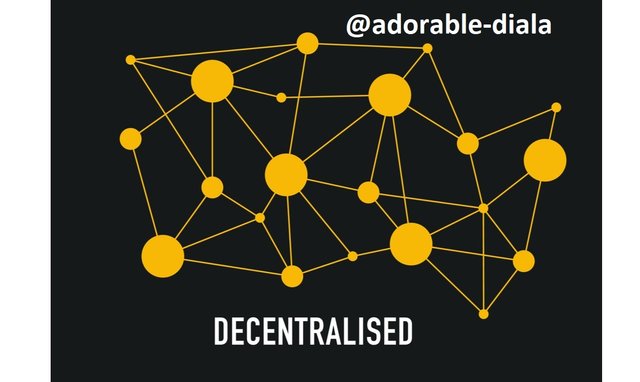
In a decentralized system a user’s information is protected using cryptographic technology. Decisions and other control affairs are not controlled by an organization or individuals but every user has control over what happens in the system.
Take for instance, applications such as Facebook, Twitter, Instagram, Bolt etc. exist and run on a computer system that is operated and owned by an organization which has full control over what happens in the platform. The backend of the application is controlled by the organization which gives the organization right to delete messages of users who have gone against the community rule. While in the case of decentralized organization, a developer can create a social media platform and launched it on a Blockchain where users can put up contents and no one even the application creator cannot delete the messages.
Also KFC is an example of a decentralized organization. The KFC in New York takes responsibility of the affairs of what happens in the eatery while the KFC in Abuja also take responsibility of the affairs of what happens in the location.
Characteristics of decentralisation
• The response time is fast
• Quick and independent decision making
• Engagement and development of employee.
• It encourages the development of individual department
• Delegation of authority to every member of the organization
• The risk and gain of decision is bore by individuals
Differences between a centralized system and a decentralized system
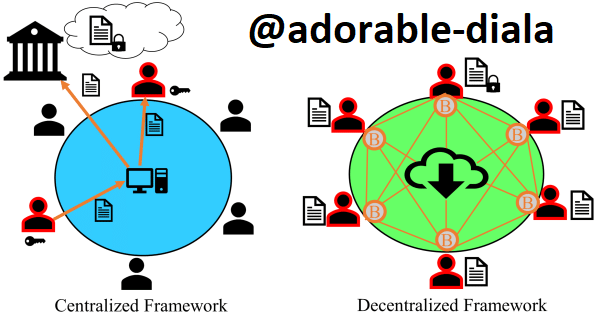
| Centralized | Decentralized |
|---|---|
| Centralized system make use of formal communication | Communication can be in any format |
| Best for small sized organization | Should be use in large organizations |
| Power and authority is uniform | There is dispersal of power and authority by the top level |
| Decision making is slow | decision making is fast |
| The system is stable because decisions are made by individual(s) having common goal | The system is prone to instability due to many conflicting decisions by the users |
| Work load is heavy on the decision makers | Work load is shared among people in the organization |
| Conflict is least likely to occur | Conflict is likely to occur |
| Does not motivate individuals | Motivates individuals in the organizations |
| Controlled by a single unit | It is not controlled by a single unit |
Before moving over to advantages and disadvantages of decentralization, it is important to consider decentralized exchange (DEX) so as to have more clarity about the topic “Decentralization”
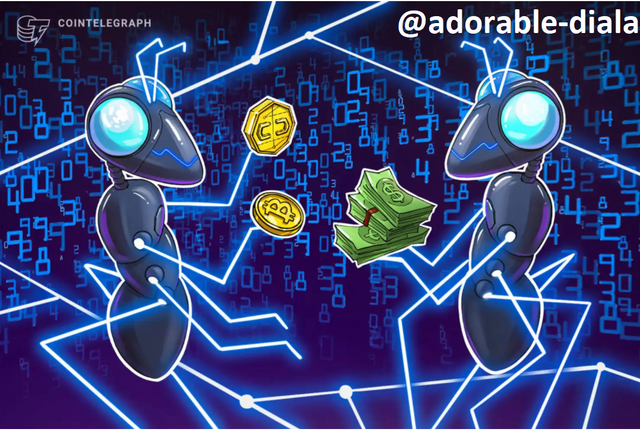
Decentralized exchanges (DEX) are per-to-per market place where traders on cryptocurrency make transactions directly without the interference of the third party. These transactions are made through smart contract written in code. Here, users have control of their wallet which can be accessed with the aid of the private key. DEXs were created to terminate the authentication of the third party during trading. It is direct from the buyer to the seller and there is no intermediary.
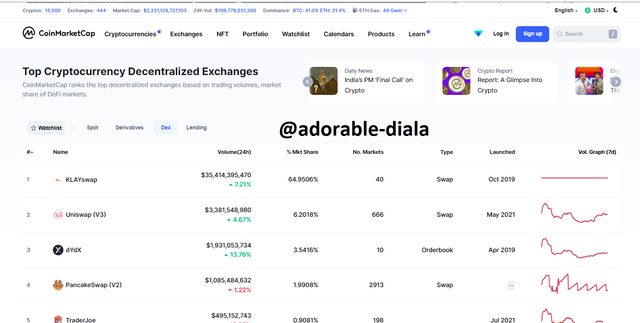
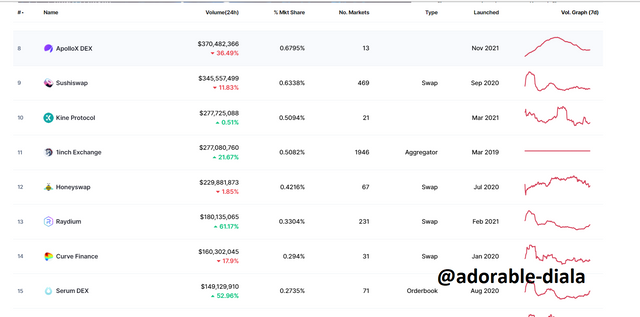
Traders has to protect their wallets and funds. They are responsible for loosing their funds if they share their private key with anyone or misplaced the private key. Fund sent to the wrong person cannot be reversed, so it is of great importance that a user should cross check details before transferring fund to another user.
Popular decentralized exchanges are built directly on the Blockchain. The most popular DEXs are built on the Ethereum Blockchain.
Advantages and disadvantages of decentralization
Everything which has advantages also had disadvantages. Just like other systems has advantages and setbacks, the success of decentralization should not take users eyes off the demerits of decentralized system.
Advantages of a decentralized system
There are many advantages of a decentralized system but I will mention but a few
• Promotes Motivation
Decentralization improves the level of job satisfaction and employee morale to work hard and climb more on the ladder of success. It promotes the cohesive and team spirit as a group.
• Growth and diversification
In decentralized organization there is healthy competition among the employees in the organization. It help the subordinates in having freedom to have their own judgement.
• Security
The security of a decentralized system is of very high standard that cannot be hacked by malicious programmers.
• Decisions are made and executed by authorized persons. This makes the result fast and accurate.
• Ease of Expansion
Decentralization makes expansion process fast. This result to creation of new business unit in different locations.
• Users have access to their money anytime they want it as it is not controlled by anyone.
• Satisfaction of Human needs
Every human has a burning desire to be independent, to acquire power, prestige and status. Decentralization serves as a tool to acquire these attributes.
• Relief to top executives
Since everyone takes his(her) responsibility in the organization, the top executives can focus more planning and other managerial duties.
Disadvantages on decentralized system
• Difficult to co-ordinate
Since every group is a unit on its own, it is difficult to coordinate the affairs of the system.
• Conflict
Decentralization puts pressure on departmental heads to realize profits at any cost. This may breed unhealthy competition.
• Lack of specialization as everyone get involved in all activities.
• Cost
Decentralization leads to duplication of staff effort.
• Require qualified personnel
When there are no qualified persons to carry out the duties in a decentralized system, then it becomes useless.
Areas of Life Where a Decentralized Blockchain can be helpful
Decentralized Blockchain is the future of trading. Though it is still criticized by many government but I’m happy some government, celebrities, Business tycoons are following the trends of decentralized exchange.
In the nearest future, it will be of great gain and importance to the society.
Areas where decentralized Blockchain will helpful are listed below:
• Energy Sector
Energy production, distribution and allocation is an important government sector. It benefits from the Blockchain through building a network where energy can be produced, stored and distribted efficiently. It also improves transparency through distributed ledgers. The use of Blockchain in the energy sector also reduce operational cost.
• Real Estate
Due to the geometric hike on properties, Blockchain has brought new features on how the real estate should operate. Through the use of tokens, properties can be rented out for a certain period using pre-defined code. Sale of property can be automated using smart contracts which enables traceable legal agreements when a certain condition is met.
• Trade Finance
Data integrity, authenticity and prove of asset has improve over the years with the aid of Blockchain. Also Dapp and smart contract on Blockchain has made automation a norm and free of error due to no interference of third party. Automated networks is trade finance has reduced operational, infrastructural and transactional cost.
• Government
Though many government are kicking against cryptocurrency but they know the importance of cryptocurrency in our world today. Identity management can be created through Blockchain. For example National Identity Number in Nigeria which is linked to every citizen’s official documents, bank details , international passport etc can be done through Blockchain. Free and fair election can be conducted with the aid of Blockchain. February, 2019 in Nigeria was believed to be rigged but with Blockchain no one can rig an election.
• Healthcare
Healthcare needs a transformation to be very effective in rendering services to patients. With the use of decentralized system, patients and healthcare providers do not have to carry their file of health report by hand as it can be stored through a secure ledger and the privacy of the patient is kept. Healthcare can easily manage electronic records which can be accessed at any point in time.
• Logistics
Blockchain can improve Logistic industries since the industry is dealing with a lot of inconsistence. It can offer security for Internet of Things and manage all the data that comes from the devices. It can help to track deliveries and maintain the deliveries in real-time.
Conclusion
The idea of decentralized Blockchain technology has really transformed a lot of things and resolved many complex problems in our present world. It has reduced malicious activities of hackers because the high level of security it provides.
Buying of goods and services across the globe is now faster and transactions are done without the interference of the third party. Transaction charges are minimal and in some case zero transaction charges. Though there are downsides but the advantages outweighs the disadvantages. So, I stand for decentralized Blockchain.
Many thanks to professor @yousafharoonkhan for the breathtaking lecture. I learnt a lot while going through your lecture.
Hello professor @shemul21 my task 4 post has not been graded and voted. my task 4 post is 5 days already.
I want to power up and join this week's crypto academy.
please help!
Downvoting a post can decrease pending rewards and make it less visible. Common reasons:
Submit